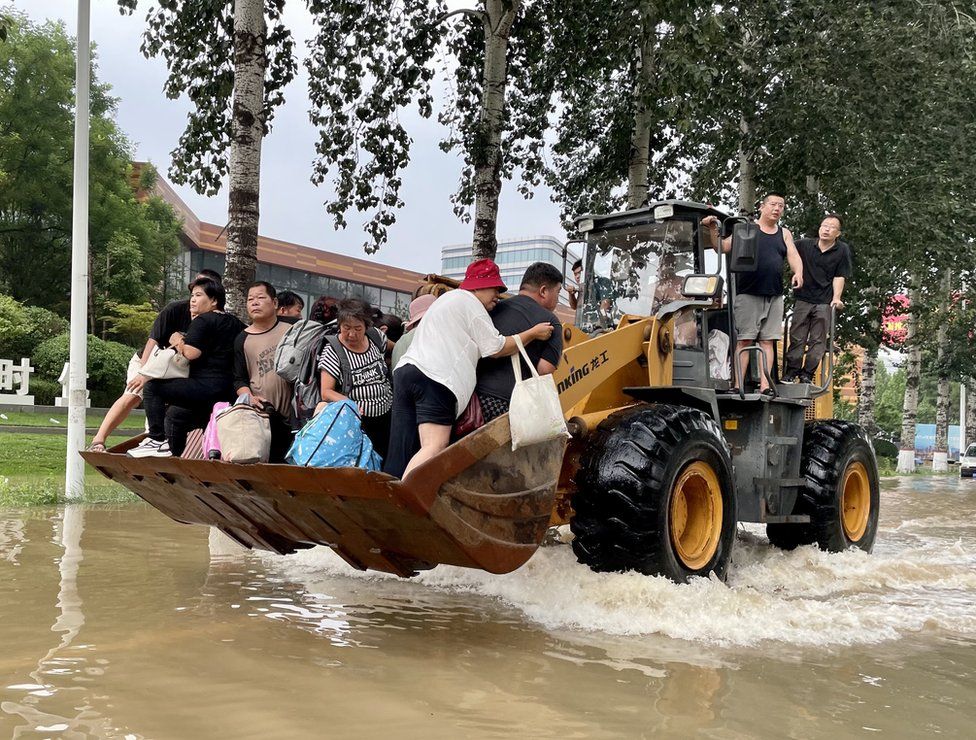ARTICLE AD BOX

Residents rescued on a bulldozer
By Stephen McDonell
BBC News, Hebei province
As the flooding emergency in western Beijing turned deadlier at the beginning of this week, taking out bridges, washing away dozens of cars at a time, and wreaking havoc on the city, the decision was made to divert the raging waters.
The effect was almost immediate. The pressure came off in the capital, but the water had to go somewhere.
By Tuesday, it was hitting Zhuozhou in neighbouring Hebei Province with a force the locals didn't expect.
The town was soon cut off from the outside as its buildings became islands. Soon the electricity and drinking water were gone.
Boats were the obvious choice for emergency teams to reach people. But with the initial rescue effort focused on Beijing with its much larger population, officials there said they were desperately short of watercraft for the task at hand.
By Wednesday, the relief effort arrived.
Fire brigade rescue teams were there in large numbers at a staging post on dry land, and boats were lined up along a road which had become a river. Inflatable craft were being launched and, using outboard motors, driven into the inundated centre of town.
Columns of heavy diggers were also driving into the safe part of town, but they weren't being used to move rock and soil. They were there to rescue people, who carrying only a few belongings, clung to the powerful trucks. Even the shovels at the front were packed with dazed residents.
Some residents say they have lost everything after the floodwater submerged their homes
As locals arrived to register at the shelters, the elderly were being helped by neighbours and family members. They looked shocked but relieved to be safe.
"We brought nothing with us," said one woman, smiling while she held her baby. Then - looking down to her child - she added: "We needed to just get out and keep this baby safe".
Next to her, an older woman nodded and said, "All the buildings around us were flooded, some up to the second floor".
Some people said they'd lost almost everything when they left their submerged homes. And yet they were relieved and extremely grateful that China's firefighters had reached them. It hasn't been an easy task. Several rescue workers died in Beijing trying to help others.
At the registration point, a woman with a megaphone directed newly arriving people to where they could get assistance. She was proud of the work they were doing but had been very worried herself as the water rose to her chest in her own house before she could get out.
It was the speed and the volume of the water which she couldn't believe. "We didn't expect it to be this bad," she said. "We didn't expect there to be so much water and, as we waited, it went up and up. We were really scared."
There has been some resentment in Hebei Province that they had to take the brunt of this potentially deadly flood to control the crisis in Beijing.
Using connected dams, reservoirs and waterways, the flood was pushed away from the Capital and into parts of Hebei where less people live.
Stranded locals registering themselves at relief shelters
Zhuozhou residents complained on social media that they were not given enough notice to escape when the decision was made to put them directly in harm's way.
Anger has only increased after Hebei's Party Secretary Ni Yuefeng proudly declared that his province would act as a "moat" to protect Beijing.
On social media people were venting.
"Is he Party Secretary of Hebei Province or Beijing? I'm confused," wrote one person.
Another was more cutting, writing "Those in power only care about their superiors. Congratulations! He'll be promoted. But the obedient 70 million residents of Hebei will be sacrificed".
The problem is that the flood relief system is simply designed this way, according to Wang Weiluo, a Chinese engineer who now lives overseas after criticising China's construction of the Three Gorges Dam.
"China's flood control network has a pecking order of protection giving priority to big important cities like Beijing, Tianjin and Shanghai, with the lowest order of importance being rural areas. Under China's system, at the bottom are the ordinary people in the city and those in the countryside whose interests are not respected," he said.
But if the water had not been diverted into Hebei, what other option did the government have?
Mr Wang suggested that, below the Yongding River, there are a series of golf courses where the flood waters could have been released.
"To discharge the water there first would cause the least economic loss and have the least impact on human lives. But those who benefit from the country's flood relief priorities are those who play golf there".
Other experts have, however, defended the Chinese government's strategy to redirect the water to safeguard "more important areas".
"Water retention and distribution zones are an important part of the flood prevention system but home to a lot of people," Cheng Xiaotao, deputy chief engineer at China Institute of Water Resources and Hydropower Research told state-run media.
"Those people are also citizens of China, sharing the right to prosper and nobody is suggesting they should be sacrificed. Also, according to law, the state will compensate those affected."
A family looking at an island of rubbish washed ashore by the flood
On the road from Zhuozhou back to Beijing, there is a bridge across a river flat which is surrounded on either side by a sea of debris - there are fridges, industrial drums and enough timber to build quite a few houses, along with basketballs and the soft padded flooring of the type children play on in pre-schools. Traditional Chinese instruments are piled up next to large truck tires and life preservers.
The most striking thing is the sheer volume of the material to have been pushed along by the flood and delivered to a single location in one go: so striking that crowds were gathering to photograph the scene as if this was some unmissable, freak act of nature.
The sudden impact of the floods has led to calls for better early warning systems in China.
Northern China's summer has, so far, consisted of months of extreme heat, followed by powerful flash flooding in areas not accustomed to it.
This week's emergency led to 21 dead according to the government and, in Hebei Province alone, more than a million people had to be moved to safety. The economic cost of these, ever more frequent, natural disasters is incalculable.
In the long run, Chinese scientists are pointing their fingers squarely at climate change as the culprit.
They want more done, more quickly, to stave off a much worse crisis in the future.

 1 year ago
14
1 year ago
14








 English (US)
English (US)